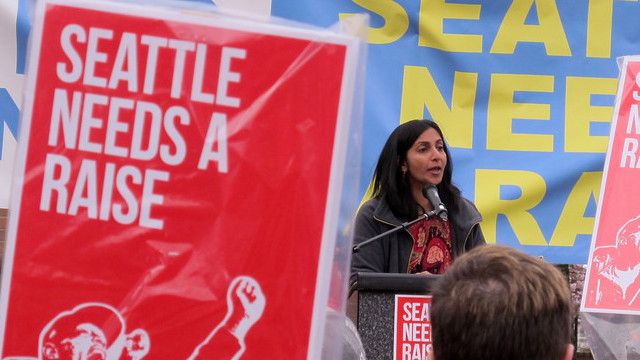This post first appeared at the Talk Poverty blog.

Protestors pause near a McDonald’s restaurant in Times Square during a rally and march in New York, Wednesday, April 15, 2015, as participants, fast food workers and union members, call for a $15 minimum wage. (AP Photo/Craig Ruttle)
Between cookouts and last outings to the pool, Labor Day weekend provided all of us a chance to celebrate the end of summer. But Labor Day should also be cause for celebration of another kind: the very reason that we have weekends off, for example. As we take stock after Labor Day, there’s much that we have accomplished, much to be grateful for, and yet so much work remains if we are to create a path to economic stability for all of us.
This Labor Day, nearly a quarter of Americans who work in the private sector couldn’t spend time with their families because they don’t have access to paid holiday time. This is just one symptom of an economic system that is out of whack—so much so that people working full-time, or two or even three jobs, can’t make ends meet. While well-connected, handsomely paid CEOs have the flexibility they need to spend time with their families and provide their children with resources well beyond the basics—too many of us are barely getting by (if that) and living to work, rather than working to live full lives.
For nearly 40 years, Americans have been working harder and more productively but aren’t seeing any change in how much they take home at the end of the week. A study from the Economic Policy Institute released this week found that many parents’ paychecks aren’t enough to cover their family’s most basic needs, and that working full-time at the federal minimum wage isn’t enough for a parent with one child to get by anywhere in the country.
Even as the economy has turned around, most Americans have failed to see improvements in their pay, according to a recent study by the National Employment Law Project. This is especially true for those who work in the retail, food service, and home-care industries, which already are among the lowest paying sectors and have seen the greatest declines in take-home pay. All the while, more and more corporations are leaving the people who cook our food and stock our shelves without the right to stand together to demand better wages and working conditions. And, profitable corporations like McDonald’s and Walmart are keeping their employees from working enough hours to pay the bills and making their lives impossible to plan.
Despite our unbalanced economy and the reality of poverty – as well as all of the forces working against the stability families so desperately need – the past few months have demonstrated the enormous potential for change that has arrived.

Kshama Sawant speak at a March 15, 2013, “March for $15” rally in Seattle. (Image: Flickr/ Shannon Kringen)
Take the minimum wage wins in Los Angeles, Seattle, Kansas City, St. Louis and Birmingham; and the wage increases for home-care providers in Massachusetts and fast-food employees in New York. Or look at cities like San Francisco that have enacted measures to ensure that massive retailers provide more hours to the clerks and cooks who work for them so that they can better pay the bills. President Obama has moved to make sure nearly 5 million men and women will soon have access to stronger overtime pay, and federal contractors will have to provide paid sick leave. And recent legal decisions have made it possible for two million home-care providers to receive a minimum wage and overtime pay after relentless organizing by the women who care for our families and want to better care for their own families, too. Finally, the National Labor Relations Board has just ruled that contractors and franchise employees can organize and hold their employers accountable for unfair treatment.
The forces that keep working people living on the brink are beginning to fall apart, and it’s not a mystery as to why: People have been standing together and pressing for change. Still, there is so much work that remains. Coming off of Labor Day, let’s celebrate the progress we’ve made together – and dig in with resolve and determination for the fight ahead.
The views expressed in this post are the authors’ alone, and presented here to offer a variety of perspectives to our readers.
Watch Bill Moyers’s interview with Sarita Gupta


